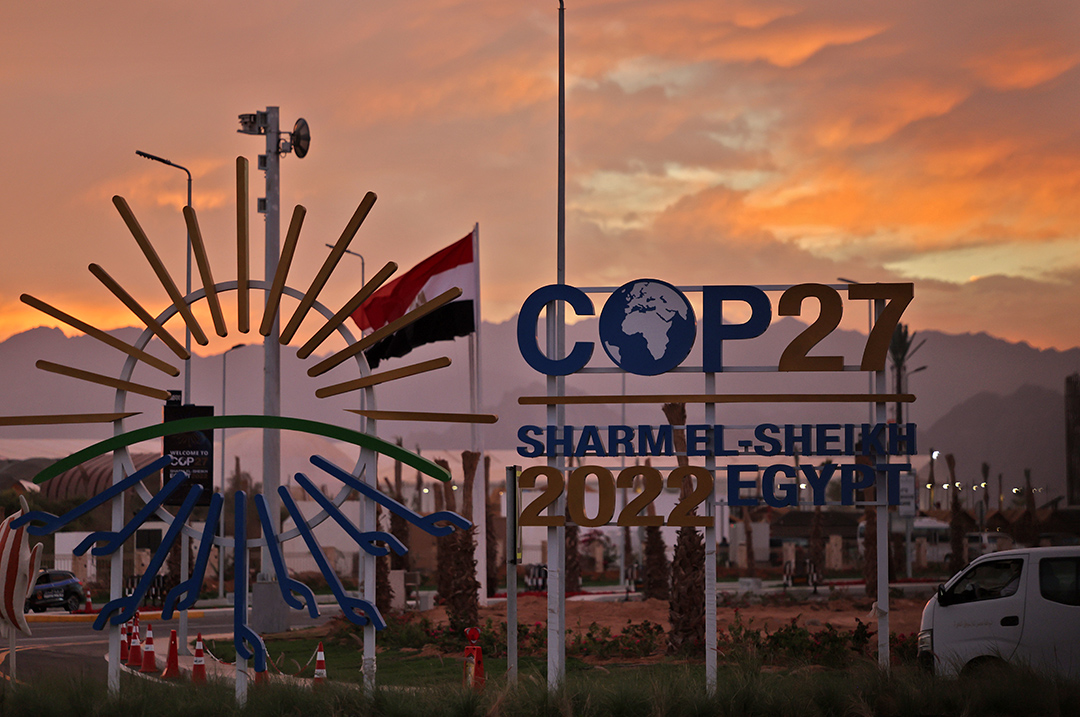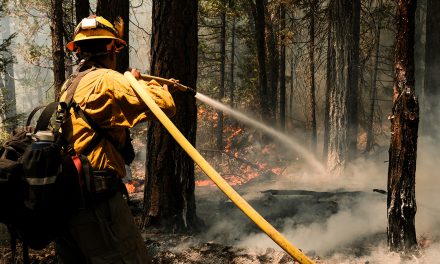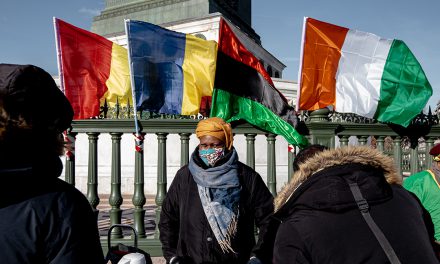Africa’s climate has warmed more than the global average since pre-industrial times. Similarly, sea level rise along African coastlines is quicker than the global average, contributing to increased frequency and severity of coastal flooding and erosion in low-lying communities. The increase in temperature has led to intense and frequent heat waves, extensive floods, tropical cyclones and prolonged droughts which have undermined human life, had a negative impact on food and water security and hampered socioeconomic development on the continent. Extreme weather patterns have caused significant damage to homes and infrastructure, and displaced millions of people.

The COP27 climate conference at the Sharm el-Sheikh International Convention Centre, in Egypt’s Red Sea resort city of the same name, on 15 Novmeber 2022. Photo: AHMAD GHARABLI/AFP
A recent study found that in aggregate dollar terms, the world’s 20 most climate-vulnerable economies have lost about $525 billion over the past two decades as a result of climate change and will continue to see negative effects on their GDP growth, even if global efforts to keep warming to below 1.5°C are met.
These events have further fuelled requests by developing nations in Africa and the global south for a standalone “loss and damage” fund and the issue was prioritised at the United Nations Climate Conference of the Parties (COP27) held in Egypt over the past two weeks.
Climate finance is generally intended to help developing countries transition to renewable energy sources and adapt to the future effects of climate change.
Loss and damage funding is intended to compensate developing countries for losses they have already incurred or will inevitably incur as a result of a climate crisis they had little control over.
Although loss and damage funding remains a contentious issue, recent commitments made by Germany, Ireland, Scotland and Denmark indicate progress. This should be seized upon as an opportunity to encourage further buy-in from developed nations to address some of the remaining problems surrounding a standalone “loss and damage” fund.
What is loss and damage?
Loss and damage refer to the adverse and often irreversible effects of climate change on people and nature beyond natural climate variability. The issue was mentioned for the first time in text during the COP13 conference in Bali in 2007, in reference to the need for more action on the issue, but no actual promises were made.
Loss and damage emerged again at the climate talks in Copenhagen at COP16, but again no suggestions were made on how to develop or implement a related funding mechanism. But the issue has gained increasing traction during global climate talks and was a priority negotiation theme at COP27.
As the financial consequences of the climate catastrophe worsen, several nations are calling for global finance systems based on notions of justice and solidarity and informed by the political dimension of the problem. Governments from developing nations seek answers and are now advocating for the creation of a global financial system that would provide continuing assistance to help countries recover from climate-related catastrophes. This is a critical issue for Africa.
Political, technical obstacles
According to the African Development Bank, seven of the 10 most susceptible countries to climate change are in Africa. Africa’s population is expected to grow substantially by 2050, housing at least 25% of the world’s population by then.
Climate migration is growing in severity, as people in the continent’s poorest regions are pushed out from environments that can no longer sustain them because of extreme weather patterns. Climate-related calamities displaced about 2.6 million people people in sub-Saharan Africa in 2021, and this trend is anticipated to continue as temperatures rise. According to the World Bank, there will be up to 85.7 million climate migrants in sub-Saharan Africa by 2050.
Despite these alarming trends, developed nations have been hesitant to address the loss and damage associated with climate change. Instead, Africa has been promised a three-year dialogue, “to discuss the arrangements for the funding of activities to avert, minimise and address loss and damage associated with the adverse impacts of climate change”.
Financing remains a contentious issue for countries such as the United States, which are concerned that committing to a loss and damage fund will expose them to legal liability and future litigation. Some developed nations are concerned that paying for such a fund may be interpreted as admitting culpability, which may result in future legal battles.
Despite US climate envoy John Kerry stating that his country is “fully supportive” of efforts to address loss and damage, the US has pushed back on or largely skirted the subject.
Moreover, the US and the European Union continue to sidestep the loss and damage issue while simultaneously investing in and benefiting from African fossil fuel projects. Since signing up to limit global warming in the 2015 Paris climate accord, the US government has invested more than $9 billion in African oil and gas projects while pledging only $682 million to sustainable energy development.
Over the past decade, the US has reportedly supported coal mining in South Africa, oil drilling in Nigeria and a huge gas project in Mozambique as part of a plan to “expand American exports throughout the continent”.
How should loss be paid?
The landmark 2015 Paris Agreement clearly acknowledges the “importance of averting, minimising and addressing loss and damage associated with the adverse effects of climate change”. But there are differing opinions on what a loss and damage fund should be or contain, including whether loss and damage constitute a type of accountability and whether compensation or even reparations need to be paid.
One-time payments from developed nations are unrealistic because climate consequences are projected to worsen in the future, inflicting much greater damage. A facility such as a solidarity fund is an appropriate option because it does not transfer liabilities. But it will not push wealthier nations to mobilise funds (as demonstrated by the $100 billion a year promise made by developed countries).
Examples can be taken from Scotland and Denmark, which have offered specific climate financing under loss and damage with a pledge of $7.3 million and $13 million, respectively. This forms part of the Climate Justice Fund set up at COP26.
Belgium has pledged $2.5 million in loss and damage funding to Mozambique while Austria and New Zealand have dedicated to funding loss and damage in the world’s most vulnerable countries. Germany and Ireland have also committed funding to the Global Shield initiative, which is committed to providing climate risk insurance and prevention support for at-risk nations.
These individual pledges remain “a drop in the ocean in comparison to what is necessary”, The Conversation reported, and are far from the constant, all-encompassing systemic reaction hoped for. An international consensus is needed at the UN. This consensus should include clear guidelines on what constitutes loss and damage, how it is calculated and which countries qualify for compensation.
Guidelines on how a loss and damage funding mechanism will be supported over time are also necessary, as well as a reporting framework for recipient countries to follow to ensure funds are spent correctly.
It is clear that Africa has yet to adjust to damages inflicted by climate change and developed countries must increase their investment to assist African countries in doing so. The costs of recovering and rebuilding from disasters on the continent surpass governments’ financial ability, leaving nations more vulnerable to future climate effects and undermining community health and well-being.
By 2030, Africa will require more than $3 trillion to adapt to the effects of climate change (and that excludes loss and damage costs). As the climate catastrophe worsens, the gap between the costs of severe consequences and nations’ abilities to pay grows wider, increasing global inequality and adding urgency to the discourse about loss and damage.
This article first appeared in the Mail & Guardian.
Leleti Maluleke is a Researcher for our Human Security and Climate Change programme. She completed her Bachelor of Political Science in Political Studies in 2017, and her Honours in International Relations in 2018 at the University of Pretoria. She started her career at International SOS in the Security Services department as a Political Risk and Security Intern. Socially, her countries of interests include Mozambique, Zimbabwe, Zambia and Malawi.












